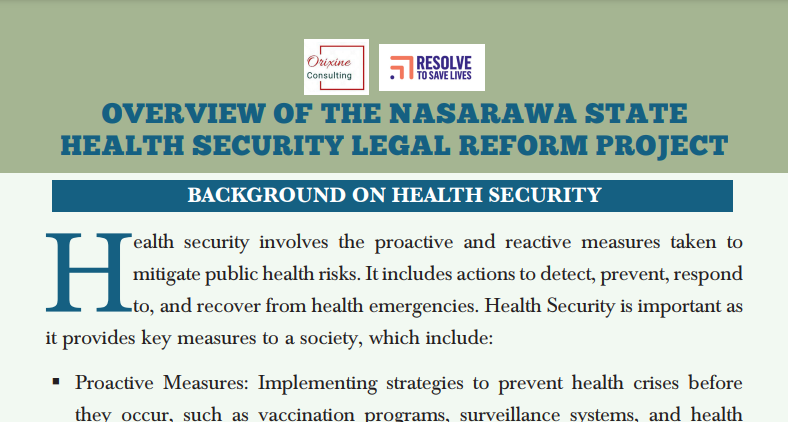
Orixine Advocates for Health Security Legal Reform in Nasarawa State
On August 13, 2024, Orixine Consulting, in partnership with Resolve to Save Lives (RTSL), conducted a high-level advocacy meeting in Nasarawa State as part of their Subnational Legal Reform Project. Aiming to advance health security, the session gathered key officials from the Ministries of Justice, Health, Environment, and Agriculture, emphasising collaboration to strengthen Nasarawa’s public health legal framework.
During the meeting, Barr. Justina Alkali Allu introduced the International Health Regulations (IHR) and underscored Nigeria’s commitment to global health standards, highlighting the need for robust legal frameworks to ensure health security. Nasarawa’s Attorney General and Commissioner for Justice, Labaran Shuaibu Magaji Esq., stressed the importance of clear roles and responsibilities in the proposed Health Security Bill and pledged support for the reform.
Barr. Emem Udoh of RTSL detailed the project’s roadmap, which includes a legal assessment, validation, drafting, and stakeholder review meetings leading to the Health Security Bill’s presentation for legislative approval. Emphasising a “One Health” approach, Udoh advocated for coordinated information sharing among all health, agriculture, and environmental stakeholders.
Participants offered strategic suggestions for the project team composition. The Permanent Secretary of the Ministry of Justice, Dr. Isaac Edoh, recommended involving the House Committee on Health, while the Director of Veterinary Services proposed including a veterinary epidemiologist and a representative from the Ministry of Education in the expanded review phase. The Ministry of Health’s Deputy State Epidemiologist, Dr. Nse Akpan, also suggested adjustments, such as adding the Director of Disease Control.
Commitment was high, with representatives pledging support and collaboration across sectors to achieve a comprehensive health security framework for Nasarawa State. This successful advocacy meeting marks a significant step toward building a resilient, inclusive legal framework that addresses public health threats and supports the state’s overall health security agenda.

